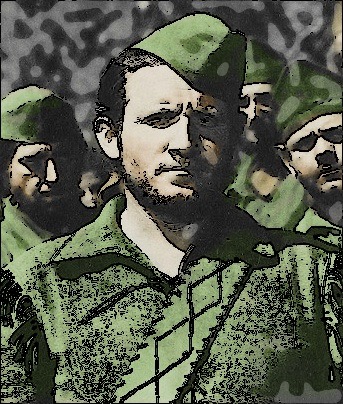After first seeing the name Zaccheus Lovewell in “Northwest Passage,” I only had to plow a bit further into Kenneth Roberts’ novel to find the page where Sergeant McNott helps Langdon Towne and Cap Huff decide which outfit they’d prefer to join, the one led by Colonel Lovewell or Rogers’ Rangers. I began to feel a tingle of déjà vu, and realized that I must have read this paragraph once before - a long time before.
“Col. Lovewell’s a nice feller; a fine old feller. He keeps his regiment pretty busy digging latrines and working on the fort. If you like to dig latrines, I’d see Lovewell. If you like to chop down trees, maybe he’ll fix it so you can chop some down and raft ‘em across the lake; but if you’d rather use a pick-axe and shovel, maybe that can be arranged, too. He’s a real accommodating feller, Lovewell is.”
On the other hand, the men who joined up with Rogers’ Rangers, according to McNott, were known as backwoods supermen who went without sleep, ate their meat raw most often, prowled the forest in the dark, and shot a few Indians out of a tree before the rest of the world was wide awake. Besides, they had the cool uniforms, a green buckskin hunting shirt and a green wedge cap worn at a tilt on the side of the head, which, in my mind’s eye, made them all look like members of Robin Hood’s merry men.

It’s not that I remember having read McNott's depiction of Lovewell before, but the feeling of being let down did seem familiar to me. The first time I picked up “Northwest Passage” I was a boy looking for a distant ancestor among buckskin-clad frontier heroes, and found instead a “fine old feller” who supervised the digging of latrines. I thought he might not have been the right man, since I believed I was looking for someone by the name of “Lovell,” although I found “Lovewell” suspiciously similar. And there was that pair of road signs out on Highway 36 alerting travelers to head seven miles north on a county road to find Lovell, or, just a mile or two farther north, Lovewell State Park. I would have to look into that someday.
I now understand that Zaccheus Lovewell was indeed the man I was hunting for. It’s also clear that as a 58-year-old colonel in 1759, he would have been a tough sell as the hero of the best-seller about the French and Indian War that Kenneth Roberts was hoping to write (Roberts was also angling for a Pulitzer, a prize that would elude him for another 20 years, until is was finally awarded for his body of work). The starring role would fall to Major Robert Rogers, who, at 28 was a veteran frontiersman, but already a controversial figure. The real Rogers had been involved in a counterfeiting scheme five years earlier, would be dogged by debt and alcoholism for the rest of his life, and would one day be remembered as the man who nabbed the patriot spy Nathan Hale and turned him over to British authorities to be hanged. Robert Rogers really was a pivotal figure in the French and Indian War, but given his subsequent career, Kenneth Roberts may have thought that it wasn’t enough to put his leading man in lifts. Everyone else, including Colonel Zaccheus Lovewell, had to climb down and stand in a trench, to make Rogers look more like a giant among men.
While reading the scene in which Langdon Towne and Hunk Marriner meet Major Rogers face-to-face, it’s hard to believe that Kenneth Roberts wasn’t already casting the movie which Hollywood would soon make. Did Roberts really write about the barrel-chested, wide-shouldered figure with fleshy lips and a voice that seemed to bubble up from some underwater source, without imagining Spencer Tracy in the part? We might think that the 5’ 10” Tracy, who was then in his late thirties, was too old and not quite tall enough to play Rogers, until we remember that he was also Spencer Tracy. Roberts hated the resulting MGM version of the first half of his novel, and despised the movie-making process itself deeply enough to lead some writers to speculate that the reason Roberts' books have never been allowed to pass into public domain, is to prevent them from being filmed.
If Roberts hated the 1940 Technicolor film directed by King Vidor, it’s a good thing he didn’t live long enough to see the TV series.